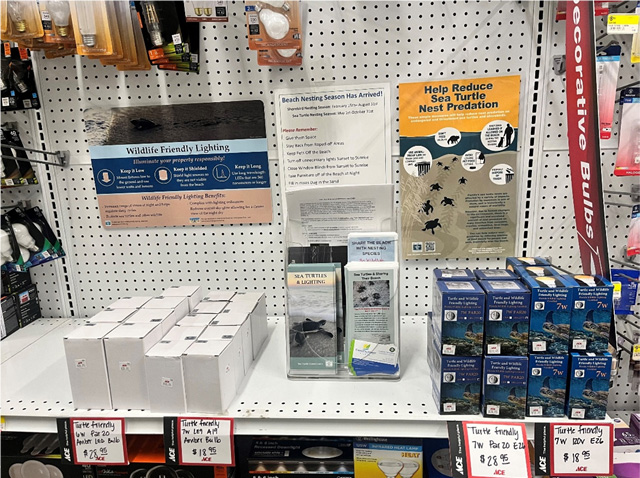Grant: 24-004E
Project Title: Addressing Barriers to Lighting Compliance Through Targeted Outreach
Project Manager: Rachel Tighe
Organization: Sea Turtle Conservancy (Non-Profit Organization)
Grant Amount: $18,500.00
Completion Date: 2025-06-19
Summary: Poorly managed coastal lighting is a leading threat to Floridas sea turtles. For decades, numerous programs offered by scientists, government agencies, and non-profit organizations have been in place to reduce problematic lighting on Florida's beaches. However, there is widespread agreement among stakeholders in Florida that more needs to be done to address two barriers to reducing problematic lighting: the inaccessibility of wildlife friendly products and the need to distribute sea turtle conservation messaging through coastal real estate agents. As it stands now, it is largely impossible for a coastal property representative to walk into a home improvement store and purchase wildlife friendly fixtures and lamps; they must be ordered through a lighting distributor that has existing relationships with manufacturers of wildlife friendly lighting. In addition, as more people move to Florida's coast from out of state, it is crucial that new residents are aware of how to protect the natural resources they are inheriting; one way to reach this audience is by providing educational materials to real estate agents that sell beachfront properties and interact directly with this important audience. Over the past few years, Sea Turtle Conservancy (STC) has begun to address lighting issues with targeted education and outreach. Through this project, STC will refine its home improvement store initiative, and provide the ability to expand STC's outreach efforts and break down two important barriers to reducing sea turtle disorientations on important sea turtle nesting beaches.  Results: Real Estate Initiative: STC identified and partnered with new real estate companies throughout Florida during the reporting period to further educate new coastal residents about sea turtle conservation. STC found potential coastal real estate companies through online research. STC cold called approximately 50 real estate companies and visited 10 offices in-person while in the field for other projects to show the real estate packets and discuss their benefits. STC continued to maintain a database to track interest and the number of packets sent to participating real estate companies. Since November 1, 2024, out of the 60 new real estate agents that STC contacted, 28 agreed to distribute folders to their clients as they purchase their beachfront home. In total, STC partnered with 39 participating real estate agents since the start of the grant surpassing our proposed target of 15-20 new agents. STC assembled and distributed 544 educational real estate packets during this reporting period and sent out a total of 612 since the start of the grant leaving 388 to disseminate during the next grant STC was awarded by the Sea Turtle Grants Program (STGP) (Figure 1). Participating realtors have expressed that they love the packets.
Results: Real Estate Initiative: STC identified and partnered with new real estate companies throughout Florida during the reporting period to further educate new coastal residents about sea turtle conservation. STC found potential coastal real estate companies through online research. STC cold called approximately 50 real estate companies and visited 10 offices in-person while in the field for other projects to show the real estate packets and discuss their benefits. STC continued to maintain a database to track interest and the number of packets sent to participating real estate companies. Since November 1, 2024, out of the 60 new real estate agents that STC contacted, 28 agreed to distribute folders to their clients as they purchase their beachfront home. In total, STC partnered with 39 participating real estate agents since the start of the grant surpassing our proposed target of 15-20 new agents. STC assembled and distributed 544 educational real estate packets during this reporting period and sent out a total of 612 since the start of the grant leaving 388 to disseminate during the next grant STC was awarded by the Sea Turtle Grants Program (STGP) (Figure 1). Participating realtors have expressed that they love the packets.
Home Improvement Initiative: STC continued to work with coastal home improvement stores to make wildlife friendly products more accessible to their communities. During this period, STC reached out to a total of 51 potential coastal hardware stores. STC identified these coastal Florida stores through online research. STC cold called 40 stores in Collier, Manatee, Lee, Palm Beach, Pinellas, and Sarasota counties and visited 11 stores in-person during other project field work in Manatee, Lee, Volusia, Palm Beach, Indian River, and St. Lucie counties (Figure 2). STC provided a packet of information to these stores, which included wildlife friendly lighting products, manufacturer contact information, and images of the displays. Since the start of this grant, STC has contacted 61 stores and 18 stores have expressed interest in participating in the program. At this time, two stores are actively participating in the initiative by stocking wildlife friendly lighting and showcasing either an end cap or aisle violator version of the educational display designed and printed during the first six months of the grant. One of the two participating stores is a location that initially worked with a local sea turtle conservation group to set up a piecemeal display.